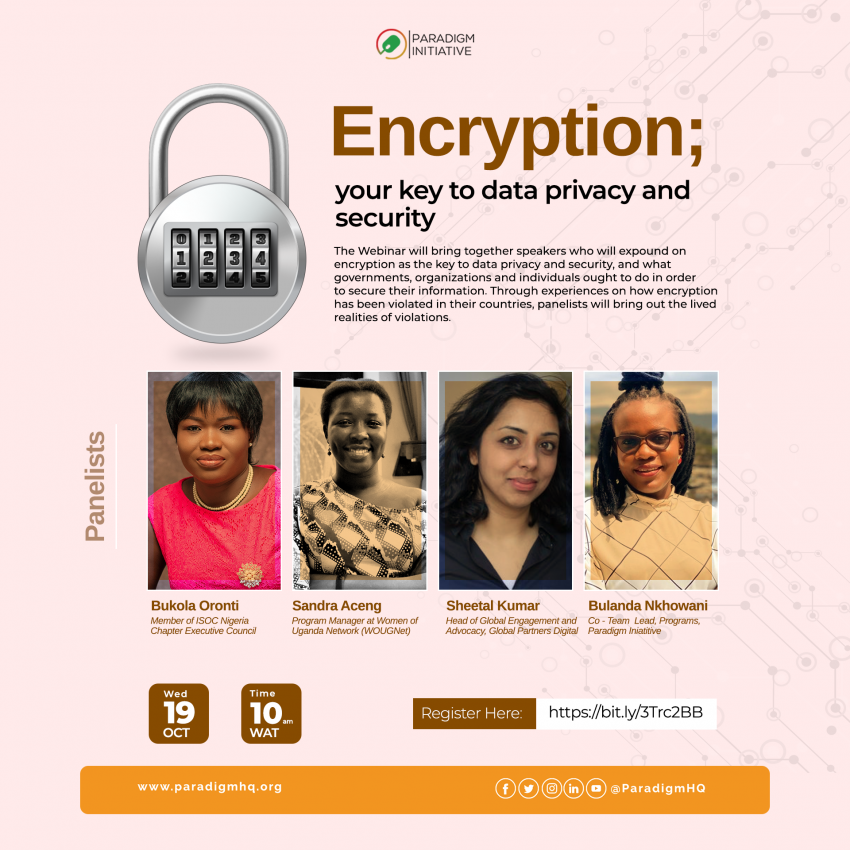What is Encryption?
It is the ability to encode communications (or information or data) so that only the intended recipient can access, read or understand them. Therefore, encryption technologies enable Internet users to protect the confidentiality of their data and communications from unwanted observation and intrusion.
Challenges / Threats:
As with most countries around the world, not only Nigeria or Africa; governments have or are trying to pass legislation that limits anonymity and the use of encryption, which in their words is to aid the government’s efforts to combat crime and terrorism.
In some cases, some governments limit the use of encryption to monitor the communications of critical journalists, human rights defenders and opposition politicians.
These laws and practices undermine the privacy rights of citizens, which in turn hampers their right to free expression and to secure use of digital technologies.
Realities in Nigeria:
In comparison with other countries in Africa and around the world, Nigeria’s law does not have an outright ban on encryption, nor is it having strict laws against encryption.
When we look at encryption through its full lens, there are still some levels of restriction on it in Nigerian law. It is clearly stated in the law that there are conditions for the interception of encrypted communications which also includes the powers to require users (or licensees) to provide the relevant agencies (i.e. security agencies) with the key, code or access to the protected or encrypted communication. An attempt by individuals not to comply with any lawful inquiry or requests made by any law enforcement agency is regarded as a criminal offence and this is punishable by improvement and/or fine. So, we can as well say that request can be made to assist in the decryption of data and is bound under the law to do so.
Simply put, in Nigeria there is no known legislation or policies on general rights to encryption, mandatory minimum or maximum encryption strength, licensing or registration requirements and import or export controls.
But it is clearly stated in sections 70 and 147 of the Nigerian Communications Act (2003) on the creation of regulations that require those licenced to operate communications systems or provide communications services with the obligations to assist the authorities in the interception of communications.
Therefore in 2019, NCC made the lawful interception of communication regulation. In it, regulation 7 allows for a judge to make a warrant authorizing the interception of any communication as described in the warrant.
Though, there is a clause to it that states that a judge may only issue a warrant where there is no other lawful means of investigating the matter for which the warrant is required, or where it is necessary as it is in the interest of the national security, for the purpose of investigating a crime for the protection of economic wellbeings of Nigerians or public emergency, or to give effect to any international mutual assistance agreements, to which Nigeria is a party, so on and so forth. Failure to comply with any of these requirements is a criminal offence punishable by a fine that is up to 5 million naira and can be incremental with 500,000 naira daily or even a jail term. This can be found in the cybercrimes act, 2015 section 45.
Outside of these clauses above, there is no other known legislation or policy obstructing encryption in Nigeria.
Opportunities of Encryption:
– Personal Security: as Internet-based crime is one of the fastest growing security threats today, encryption is more important than ever. End-to-end encryption is seen as a secure form of encryption because sensitive and confidential information is being transmitted by billions of people online daily and it must be kept out of the hands of criminals.
– National Security: end-to-end encryption helps prevent criminals, spies, terrorists and hostile governments from accessing and exploiting confidential communications of government officials and penetrating computer systems and databases that could cause wide-scale, systemic disruptions to economies, infrastructure and security. It also protects private, confidential communications of security agencies.
Closing Remarks:
Generally, encryption backdoor is never the answer in any situation, thus one of the reasons behind the encryption advocacy. Encryption backdoor is a forced weakness that weakens us all, as it allows good actors so will it allow bad actors once they locate the backdoor.

